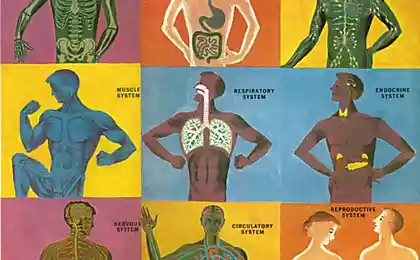1038
The more dangerous thick blood and what to do?

Some know that it is necessary to thin the thick blood. Slow blood flow leads to oxygen starvation of the internal organs. And the possible formation of blood clots.
So what should you do to blood to circulate freely. A few simple tips.
Preventing blood clots
1. Drink more water! 90% of people drink very little water. It is about water, not liquids. An adult should drink daily 2-2, 5 liters of water. In a little more. Encourage your children to drink water. Natural water - the first and a very powerful tool against the formation of blood clots
. 2. blood thinners Products:
- Olive oil and linseed oil;
- Apple cider vinegar;
- Garlic and onions (regular consumption of garlic reduces the likelihood of blood clots by half!);
- Lemons;
- Sunflower seeds;
- Beets;
- Tomatoes, tomato juice;
- Oatmeal;
- Raspberries, blueberries, cranberries, strawberries, cherries;
- Ginger
Every day 2-3 product from this list should be in your diet.
3. Products, thickening the blood:
- Meat broths;
- Sausages;
- Smoked;
- Jelly;
- White bread;
- Cream;
- Lentils;
- Wild rose;
- Chokeberry;
- Bananas and mangoes;
- Many herbs (St. John's wort, valerian, nettle, yarrow, corn silk, Persicaria maculosa) - herbs should be drunk courses and in any case not always
! 4. Significantly increase the viscosity of the blood:
- Smoking;
- Spirits
- Large amounts of salt;
- Diuretics, hormonal contraceptives and drugs, as well as "Viagra»;
5. Move more, you walk or exercise, visit the open! air.
Advice on nutrition:
Thick blood means that increased its viscosity. Viscosity is affected by many factors. This damage to blood vessels, the liver, leading to variations in the chemical composition and increase the viscosity of the plasma, a change in the normal state of the cell membranes of erythrocytes and platelets, which leads to increased adhesion of these cells.
Ratio can be disrupted cell mass and the liquid portion of blood. The high viscosity of the blood increases the risk of blood clots in the heart and blood vessels.
Blood thinners promotes diet and drinking a special mode. It should drink at least 1, 5 liters of liquid per day. Most useful green tea or herbal teas (on the recommendation of the attending physician), natural fruit and vegetable juices, water. Especially recommended to drink fresh juice from red grapes. Due to the high content of bioflavonoids, it is considered a balm for the cardiovascular system.
An additional source of omega-3 unsaturated fatty acids is flax seed oil, which can take 1 tbsp. spoon per day. Prostaglandins are synthesized from these acids, reduces cholesterol and blood thinners.
Another important source of fat is unrefined extra virgin olive oil, containing a large number of biologically active substances.
Regular consumption of seaweed activates a number of enzymes and improves digestion of proteins, iron and phosphorus, reducing "bad" cholesterol and resulting in exerts anti-atherosclerotic effect, lowers the viscosity of blood. It is better to use a pharmacy laminaria, as it passes the necessary control. Dry the cabbage you can grind in a coffee grinder and eat instead of regular salt.
Nuts contain a lot of protein, minerals (calcium, magnesium, potassium). Walnuts, almonds and cashew large amounts of the amino acid arginine, which is formed from nitric oxide in the body. That it reduces blood clotting. The recommended daily dose of nuts - '30
When bleeding disorder useful products with a high content of natural vitamins and enzymes. Good to eat daily for 1-2 items. spoons germinated wheat seeds, they contain vitamin E, which enhances the anticoagulant effect. Germinated seeds are dried, ground in a coffee grinder and added to salads or in any dish. Important to regularly use this valuable product.
Blood thinners to help fresh onions and garlic. And they also reduce blood "bad" and increase "good" cholesterol, protects the enzyme system from damage by free radicals. Results can be expected if the daily hard to eat half of medium-sized bulbs or cloves of garlic.
It improves the condition of the vessel walls and blood flow sweet pepper, rich in vitamin C and other biologically active substances. Enough to eat peppers per day.
Very good relationships deserve tomatoes. They contain a substance that decreases blood clotting, "stickiness", and reduces the risk of platelet thrombus. The same substance is present in tomato juice and tomato sauce.
In violation of the biochemical composition of blood and activation of the clotting process and other useful vegetables: zucchini, squash, pumpkin, eggplant, turnips, lettuce, celery, beans green beans, cucumbers
. It improves blood flowing properties of melon. These same properties and ginger. It is added to ready meals.
With increased blood viscosity and a high risk of thrombosis should be excluded from the diet of bananas.
It is not recommended and often consume large amounts of leafy vegetables, yoghurt, alfalfa, soybean oil, cod liver oil capsules. All these foods are natural sources of vitamin K, which makes it difficult to control the dose of anticoagulants and other blood-thinning drugs. In large doses, vitamin K may enhance blood clotting.
It is better to eat the food fresh, steamed or baked, boiled or stewed. The oil should be added in the prepared dish.
























